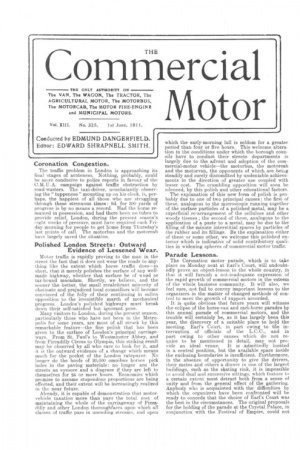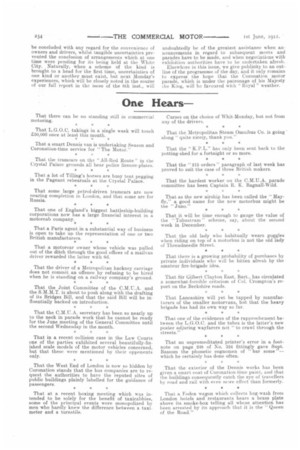Coronation Congestion.
Page 1

Page 2

If you've noticed an error in this article please click here to report it so we can fix it.
The traffic problem in London is approaching its final stages of acuteness. Nothing, probably, could be more conducive to police reports in favour of the C.M.U.A. campaign against traffic obstruction by road-wasters. The taxi-driver, nonchalantly observing the " tuppences " mounting up on his clock, is, perhaps, the happiest of all those who are struggling through these strenuous times: 8d. for 300 yards of progress is by no means a record. Had the horse remained in possession, and had there been no tubes to provide relief, London, during the present season's eight weeks of pressure. must have required each Friday morning for people to get home from Thursday's last points of call. The motorbus and the motorcab have largely saved the situation.
Polished London Streets: Outward Evidence of Lessened Wear.
Motor traffic is rapidly proving to the man in the street the fact that it does not wear the roads to a.:nything like the extent which horse traffic does—in short, that it merely polishes the surface of any wellmade highway, whether that surface be of wood or tar-bound macadam. Shortly, we believe, and the sooner the better, the small recalcitrant minority of obstinate and prejudiced local councillors will become convinced of the folly of their continuing in sullen opposition to the irresistible march of mechanical progress. London's polished highways must break down their self-satisfied but ignorant pose. Many visitors to London, during the present season, particularly those who have not been in the Metropolis for some years, are most of all struck by this remarkable feature—the fine polish that has been given to the surface of London's principal carriageways. From St. Paul's to Westminster Abbey, and from Piccadilly Circus to Olympia, this striking result may be observed by all who care to look for it, and it is the outward evidence of a change which means much for the pocket of the London ratepayer. No longer do the hoofs of 20,000 omnibus horses pick holes in the paving materials: no longer are the streets an eyesore and a disgrace if they are left to themselves for 24 or more hours. Economies which promise to assume stupendous proportions are being effected, and their extent will be increasingly realized in the near future.
Already, it is capable of demonstration that motorvehicle taxation more than pays the total cost of maintaining the whole of the carriageway of Piccadilly and other London thoroughfares upon which all classes of traffic pass in unending streams, and upon which the early-morning lull is seldom for a greater period than four or five hours. This welcome alteration in the conditions under which the borough councils have to conduct their streets departments is largely due to the advent and adoption of the commercial-motor vehicle—the motorbus, the motorcab and the motorvan, the opponents of which are being steadily and surely discomfited by undeniable achievements in the direction of greater use coupled with lesser cost. The crumbling opposition will soon be silenced, by this polish and other educational factors. The explanation of this new form of polish is probably due to one of two principal causes: the first of these, analogous to the microscopic running together of the surface particles of a polished metal, may be a superficial re-arrangement of the cellulose and other woody tissues ; the second of these, analogous to the application of a paste to a metal, may be due to the filling of the minute interstitial spaces by particles of the rubber and its fillings. Be the explanation either of these or some other, we welcome this polished exterior which is indicative of solid contributory qualities in widening spheres of commercial-motor traffic.
Parade Lessons.
The Coronation motor parade, which is to take place on Monday next at Earl's Court, will undoubtedly prove an object-lesson to the whole country, in that, it will furnish a not-inadequate expression of the rapid growth of commercial motors in the esteem of the whole business community. It will also, we feel sure, not fail to convey important lessons to the organizers in the matter of changed methods of control to meet the growth of support accorded. It is quite obvious that future years will witness the eclipse of the horse-van and cart-horse parades by this annual parade of commercial motors, and the trouble will certainly be, as it has largely been this year, the discovery of a suitable place to hold the meeting. Earl's Court, in part owing to tlie intervention of officials of the L.C.C., and in part owing to other causes which do not require to be mentioned in detail, may not provide an ideal venue. It is admittedly located in a central position, but the available space inside the enclosing boundaries is insufficient. Furthermore, in the absence of opportunity to give the drivers, their mates and others a dinner in one of the largest buildings, such as the skating rink, it is impossible to avoid dual and successive sittings. which feature to a certain extent must detract both from a sense of unity and from the general effect of the gathering. Anybody who is acquainted with the difficulties by which the organizers have been confronted will be ready to concede that the choice of Earl's Court was the best in the circumstances. The original proposals for the holding of the parade at the Crystal Palace, in conjunction with the Festival of Empire, could not be concluded with any regard for the convenience of owners and drivers„ whilst tangible uncertainties prevented the conclusion of arrangements which at one time were pending for its being held at the White City.. Naturally, when a scheme of the kind is brought to a head for the first time, uncertainties of one kind or another. must exist, but next Monday's experiences, which will be closely noted in the course of our full report in the issue of the Bth inst., will undoubtedly be, of the greatest assistance when announcements in regard to subsequent meets and parades have to be made, and when negotiations with exhibition authorities have to be undertaken afresh..
Elsewhere in this issue, we give publicity to an out-. line of the programme of the day, and it only remains to express the hope that the Coronation motor parade, which is under the patronage of his Majesty Lite King, will be favoured with " Royal" weather.




















